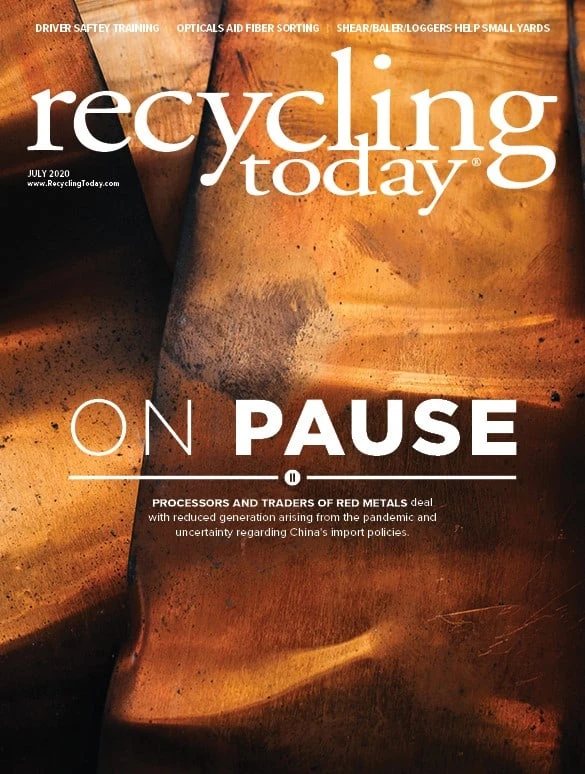Throughout much of 2019, demand for copper and aluminum scrap was soft and the domestic market was oversupplied. The situation appeared to be improving late in 2019, but then the pandemic hit, leading to a slowdown in manufacturing, particularly in the automotive sector, which affected primary and secondary aluminum producers most acutely.
In a webinar hosted by the Bureau of International Recycling (BIR), Brussels, June 3, Rick Dobkin of Shapiro Metals, headquartered in St. Louis, said the automotive industry in the U.S. was closed in April and much of May and production was just ramping up as of early June. “Those that have started have found serious challenges with supply chain issues,” he added.
Scrap flowing into yards in the U.S. and Mexico had fallen by 35 percent to 70 percent, Dobkin said, while Canada saw a nearly 60 percent drop arising from reduced industrial activity and virus-related safety restrictions.
In a webinar hosted by the Institute of Scrap Recycling Industries, Washington, May 27, Jason Schenker, chairman of The Futurist Institute and president of Prestige Economics, Austin, Texas, said he expected auto sales to remain weak as the year progresses. “More than 1 in 4 people are unemployed right now,” he said, adding that does not bode well for the automotive and housing markets.
“Traders believe this new policy will have positive outcomes for the future of scrap trading worldwide.” – Shen Dong of OmniSource Corp., Fort Wayne, Indiana, on China’s reclassification of high-purity nonferrous scrap
“There is going to be a bit of a mixed bag for aluminum going forward,” Schenker said, as aluminum will be weighed down by the automotive sector but supported by nondurable goods consumption.
In the BIR webinar, Atlanta-based Uni-All Group Ltd.’s David Chiao, president of the BIR’s Nonferrous Metals Division, said that while China’s recycled material reclassification is scheduled to enter into force July 1, the country has yet to issue information in English about the specifications to be adopted or how the change will affect China Certification & Inspection Group inspections. This statement was echoed by Shen Dong of OmniSource Corp., Fort Wayne, Indiana, who added, “Traders believe this new policy will have positive outcomes for the future of scrap trading worldwide.”
Under this shift in Chinese policy, any materials that continue to be classified as “scrap” cannot be imported into the country after Dec. 31, Chiao said.

In Europe, copper and copper alloy scrap were in short supply during the lockdowns, Murat Bayram of U.K.-based European Metal Recycling Ltd. said in the BIR webinar. Estimates of metal scrap availability in May varied from 80 percent of normal levels in Sweden to just 50 percent of normal levels in Italy and Spain, which corresponded with the relative severity of these countries’ lockdowns. “The more an area was affected by the virus, the less scrap that was flowing,” he said.
BIR guest speaker Eugen Weinberg, a senior commodity analyst at Commerzbank, Frankfurt, Germany, said COVID-19 “will have a long-lasting impact beyond the health issues.”
Metal prices as of early June reflect “expectations of a swift recovery” and the “huge monetary stimulus by central banks worldwide,” he said, rather than the “real situation.” Weinberg added, “We have yet to come to terms with how bad the current situation is.”
He said he expected “a big disappoint” as second-quarter figures would reveal the extent of the crisis. “I hope I’m wrong about my expectations, but I think the worst is yet to come.”

Explore the July 2020 Issue
Check out more from this issue and find your next story to read.
Latest from Recycling Today
- Aqua Metals secures $1.5M loan, reports operational strides
- AF&PA urges veto of NY bill
- Aluminum Association includes recycling among 2025 policy priorities
- AISI applauds waterways spending bill
- Lux Research questions hydrogen’s transportation role
- Sonoco selling thermoformed, flexible packaging business to Toppan for $1.8B
- ReMA offers Superfund informational reports
- Hyster-Yale commits to US production





